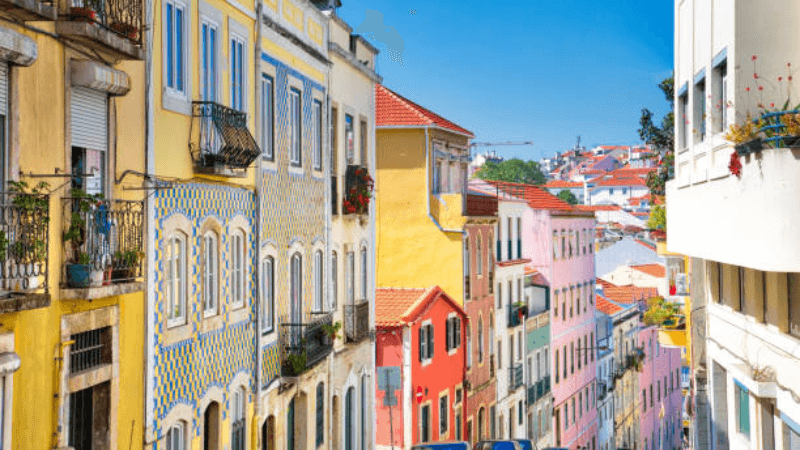So, you’re thinking about moving to Lisbon? You’re not alone.
Portugal’s capital has become a magnet for digital nomads, freelancers, and expats—especially solo women looking for culture, community, and coastal living. From its pastel-painted streets to laptop-friendly cafes and mild winters, there’s a lot to love.
But what’s it really like for a woman moving to Lisbon alone?
In this guide, we’ll share the real deal: from why people are moving to Lisbon to the pros and cons, how safe it feels, and what to know before moving to Lisbon as a solo female traveler.
Why Are People Moving to Lisbon?
There’s a reason you keep hearing about people packing up and heading to Portugal. Several reasons, actually:
- Mild climate year-round
- Growing remote work & tech scene
- Lower cost of living compared to Western Europe
- Great food and wine culture
- Central location for travel across Europe
If you’re asking why are people moving to Lisbon, it’s the combination of lifestyle, affordability, and community that keeps drawing people in. For many women looking to switch up their environment, living in Lisbon as an expat offers balance, inspiration, and fresh opportunities.
Is Lisbon Safe for Solo Female Travelers?
Let’s talk safety—because it’s valid and important.
Short answer: Yes. Lisbon is generally safe for solo women.
It ranks among Europe’s safest capitals, and violent crime is very low. As a solo female, you’ll likely feel safe walking around during the day and evening, especially in neighborhoods like:
- Príncipe Real
- Campo de Ourique
- Chiado
- Estrela
If you’re wondering, “is Lisbon safe for solo female travels?” the answer is yes—with the usual precautions you’d take anywhere.
I would avoid these areas: Martim Moniz and Mouraria (drugs dealer, violent, etc.)
Tip: Use Uber or Bolt at night if you’re heading home alone from an event or bar. Lisbon is walkable, but hilly—and it’s always okay to prioritize comfort and safety.
What to Know Before Moving to Lisbon
Before you pack your bags and book a one-way flight, there are a few essential things to understand about life in Lisbon—especially if you’re a woman arriving solo. While the city is warm and welcoming, some aspects of daily life can catch newcomers off guard. Here’s what to know before moving to Lisbon so you can feel more confident and prepared:
Language

Portuguese is the official language of Portugal, and while Lisbon is quite international, don’t expect everyone to speak English fluently—especially in government offices, local supermarkets, or older parts of town. That said, younger locals and professionals in cafes, coworking spaces, and restaurants usually speak good English for basic interactions.
Still, learning some Portuguese, even just greetings or polite phrases, can go a long way toward building connections and showing respect for the culture.
Tip: Enroll in a beginner Portuguese class when you arrive, or use free apps like Duolingo before your move. This is one of the key things to know before moving to Lisbon that will help you feel more integrated.
Visas

If you’re an EU citizen, the good news is you can live and work in Portugal without needing a visa. For non-EU citizens—like Americans, Canadians, or Australians—there are now several visa options for long-term stays. The most popular ones include the D7 visa, ideal for passive income earners, and the Portugal digital nomad visa, which is perfect if you’re earning remotely and want to stay longer than the typical 90-day tourist window.
Both visas require proof of income, health insurance, a clean criminal record, and accommodation. One of the most important things to know before moving to Lisbon is that the visa process can be slow and document-heavy—so start early and stay organized.
Cost of Living & Housing in Lisbon

One of the key things to know before moving to Lisbon is that housing has become more competitive in recent years. While living in Lisbon as an expat is still more affordable than in cities like London or Paris, rent in central areas like Príncipe Real or Santos can range from €1,000–€1,600 for a one-bedroom. Groceries, dining out, and public transport remain budget-friendly, and many nomads enjoy working from cafes in Lisbon to save on coworking fees.
Health & Safety

Portugal has both a public and private healthcare system, and both are accessible and affordable when compared to most other Western countries. If you register as a resident, you’ll have access to public healthcare, though many expats choose private health insurance for faster appointments and English-speaking doctors. Pharmacies are well-stocked and pharmacists are often the first point of contact for minor health issues—they’re knowledgeable and helpful.
Safety-wise, living in Lisbon as an expat woman feels secure. Most neighborhoods are walkable even at night, and locals are generally helpful and respectful.
Transportation

Lisbon’s public transport system is clean, reliable, and budget-friendly. The metro, buses, and iconic yellow trams are easy to use with a rechargeable Viva Viagem card (the card cost 0.50€ and you can recharge it with the Zapping system).
Zapping = you add money in the card and everytime you use it, the card will take 1.66€/journey (in Lisbon)
While moving to Lisbon will definitely improve your step count (those hills!), the city’s walkability is part of its charm. Rideshare services like Uber and Bolt are also widely available for late-night or uphill trips.
Move to Lisbon: Pros and Cons
Every destination has its trade-offs. Here’s an honest look at the move to Lisbon pros and cons:

Pros
- Warm, sunny climate
- Delicious food and wine culture
- Growing expat and nomad communities
- Lots of cafes in Lisbon to work remotely
- High walkability and scenic neighborhoods
Cons
- Bureaucracy can be slow and frustrating
- Rising rental prices in popular neighborhoods
- Hills can make walking a workout
- Portuguese can be difficult to master for some

Additional Tips for Female Expats & Digital Nomads
One of the most important things when moving to Lisbon—especially as a solo female traveler—is finding your people. Lisbon can feel exciting but overwhelming at first, which is why joining the right community from the start makes all the difference.
Join Nomad Girls Club
If you’re looking for meaningful connections, support, and fun as a woman living abroad, Nomad Girls Club is the best place to start.
Use the Meetup App for Instant Social Life
Lisbon’s Meetup scene is buzzing. You’ll find groups for remote workers, wellness lovers, startup founders, creatives, and even pet owners. Weekly events include things like coworking mornings, sunset picnics, and language exchanges, are some of the most valuable things to know before moving to Lisbon to build your social life.
Join a Coworking Space to Feel Grounded
While Lisbon’s many cafes are great for working short-term, a good coworking Lisboa space can give you structure, focus, and instant community.
Say Yes to One New Thing a Week
When you’re adjusting to life abroad, it’s easy to stay in your comfort zone. But saying “yes” to even one social event, class, or café meet-up per week can totally shift your experience—especially important when moving to Lisbon as a solo female traveler.
Final Thoughts on Moving to Lisbon as a Woman
If you’re dreaming of a European city with sunshine, community, and a slower pace of life, moving to Lisbon is a strong option. As a solo female, it offers safety, opportunity, and enough café culture to make any remote worker feel at home.
With the right planning, some patience for the paperwork, and a bit of Portuguese, Lisbon can become not just a destination—but your home base.

